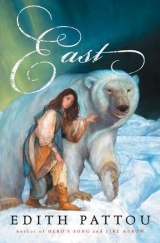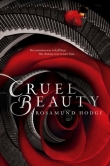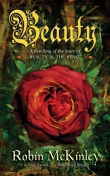
Текст книги "East "
Автор книги: Эдит Патту
сообщить о нарушении
Текущая страница: 22 (всего у книги 24 страниц)
Troll Queen
MY PEOPLE GAVE MYK a great ovation when he finished playing his flauto. As I knew they would. He has won them over and shall be a well-loved king.
Taking our places for the wedding ceremony, we stood facing my people, Tuki at Myk's side and Urda beside me. I opened my mouth to begin the words of binding, when suddenly Myk stepped forward, turning to face me. He got down on one knee and gazed up at me. This was not at all the order of events. I had gone over these with him many times and wondered if he had gotten confused.
"I have a very great favor to ask of you, my queen," he said loudly.
"Of course. What is it?" I replied. I heard a very faint murmuring from those trolls sitting in the rows closest to the front.
"There is an old custom in the land I come from," Myk said. "Will you humor me and allow me to ask you a question, before we say the words of binding?"
His words puzzled me. This must be from some old memory of his homeland that had suddenly returned. I did not understand why this should be happening now. But I smiled at Myk. "You may ask me anything," I said.
"Thank you, my queen," he replied. "In the land I come from, the question is asked so that a man may know if his intended bride will be a good wife to him. If she will care for him and the home they will share."
I nodded.
"Will you wash a piece of clothing for me, my queen?" Wash a piece of clothing? I stared at him. What sort of strange, outlandish custom is this? I thought. It was irksome that he should have had this returned memory, now of all times. Probably some softskin servant triggered it. It is settled then—I shall get rid of all the softskin servants as soon as possible. They are more trouble than they are worth.
"My queen? Will you grant my request?"
The murmuring grew louder. My people knew this was out of the ordinary. They were waiting for my response. Myk's eyes were on me, too.
"Yes, Myk. I will honor this tradition of your land, and after I have done it, then we will proceed." It was annoying, but the proposition was a simple one. With my arts I could wash anything clean.
"Then you agree to honor my tradition—I shall marry the one who washes a garment of my choosing."
All eyes were on us. Tuki let out a little squeaking sound. His pathetic eyes shone with excitement. It was then I felt the first glimmer of unease. I did not see how Myk should have memories of wedding traditions of his homeland when he drank the slank every day. But I could not back down, not with my people watching. It would make me look weak. And I could not back down because of the foolish rules my father had imposed on me.
"I agree, Myk." After all, it was a small request, insignificant, one easily done.
Myk got to his feet and crossed to his flauto case. From it he withdrew a white bundle of cloth and carried it to me.
Gesturing at Tuki I said, "Bring me water and soap."
Tuki nodded eagerly and disappeared in the direction of the kitchen.
As we waited Myk again kneeled in front of me, taking my hand and looking up at me. "You are patient and kind, my queen, to indulge me in this tradition of my homeland."
I was reassured by his words and by the warmth in his voice. And yet there was something about him, I noticed suddenly, something different.
Tuki returned and handed Myk a bucket that was filled with warm water. Myk brought it to me.
I shook out the white cloth and held it up. It was a shirt with a dull gray stain on the front. Where had Myk gotten this shirt? I wondered. Something was not right. But there could be no trick, no deception. The slank had never failed.
I took the bucket of water from Tuki and a bar of white soap he also handed me. I did not want to kneel over the bucket—that would not do—so I ordered a table brought. I set the bucket on the table.
"In the country of your future king," I said to my people, speaking loudly and with dignity, "they have a ritual before binding, and it is to honor him that I cleanse the shirt."
I dipped the shirt in the water, rubbed the stain with the soap, working it in until the fabric was covered with suds. In truth, I had never washed cloth in my life, for that is servants' work, but I had seen it done. The stained part was hard against my fingers, which puzzled me. But I concentrated, felt the tingling of power in my fingertips. Then I rinsed the shirt. Holding it up so the stain faced me, I saw that instead of fading away, the stain was, if anything, larger and darker than before.
Something bubbled in my brain. This was not right. It cannot be.
Calling on my arts, I immersed the cloth again. The soap churned white in the water; the surface of the soapy liquid swirled and foamed. Iridescent bubbles fizzed up into the air. All eyes were on me as once again I lifted the shirt from the water.
The stain had blackened, hardened. I let out a cry of rage. This could not be happening. Was it some sorcery? One of the southern trolls seeking to undo me? But why? My eyes found Myk. He was not looking at me but at someone walking toward him, wearing a dress that resembled the moon. I had seen it before—She stepped forward.
"May I try to wash the shirt?" she said.
Then I knew. She wore a mask, but it was her. The softskin girl. She had come for my Myk. It was impossible. Yet there she stood, her face hidden by the mask, but her eyes filled with the most provoking bravery. Did she not know I could destroy her with little more than a thought?
I should have done so, right then, but everyone was watching, and it would have looked like weakness to refuse. If I with my arts had failed to clean the shirt, then so would she. Myk must see her fail once again. There would be ample time to destroy her after she had been defeated.
I saw Tuki cross to the softskin girl. She said a few words to him, and nodding eagerly, he darted away. Urda was speaking to me, buzzing in my ear, asking who the troll girl in the moon dress was. I told Urda she was a fool—this was no troll. Did she not recognize the softskin girl whom she had waited on in the castle? Urda recoiled, muttering under her breath.
I stared at Myk. His face was unreadable. Had he planned this? With Tuki? I could not believe it of him. Myk was mine, body and soul.
Tuki returned with several pieces of kindling, a large stone tile, a bar of white soap like the one I had used, and an iron pot with water in it. He gave these to the softskin girl. Urda ran to Tuki, taking him by the arm and hissing at him. He merely smiled at her, shaking her hand off gently, then gestured toward the softskin girl.
My people had been murmuring during Tuki's absence, but all grew quiet as we watched the softskin girl stack the kindling on the stone tile, light it with a striker Tuki had also brought her, and set the pot of water atop it.
Rose
I MADE THE SHIRT. I spun the thread from sheep's wool and white-bear fur. I wove the thread on the loom. I stitched the cloth into a shirt that fit the man who had been a white bear.
And I knew the way to remove tallow from fabric.
But the Troll Queen, with all her arts, had been unable to remove the stain. Was there really any hope that I should succeed?
I held the cloth in my hand, remembered well the feel of it in my hands as I folded it every morning and laid it on his side of the bed in the castle. And also the feel of it, wet and soapy, the many times I had washed it.
I dipped the shirt into the hot water, pulled it back out, then worked soap around and onto the stained, stiff area. When the water was boiling, I carefully lowered the shirt into it, then stirred the bubbling brew into a froth with a wooden stick Tuki had given me. I suddenly remembered the rhyme Estelle had taught me.
The old woman must stand at the tub, tub, tub,
The dirty clothes to rub, rub, rub;
But when they are clean, and fit to be seen,
Shell dress like a lady and dance on the green.
After a few minutes had gone by, I used the stick to lift the shirt out of the water. It gleamed white, steaming in the cool air of the ice palace. There was no stain.
A murmur swelled from the trolls standing closest to the front, then it grew even louder, working its way around the enormous room and up into the balconies.
Before anyone could move, Tuki bounded across to me and said in troll language, with a loud voice, "It is Rose—Rose will marry the prince from the green lands!"
I looked up at the Troll Queen then, and the ferocious and baffled rage on her face was a terrible thing to see. Instinctively I dropped the steaming shirt on the ice floor and reached for Tuki, thinking somehow to protect him, but too late, too late.
Troll Queen
I DID NOT THINK. I wanted heat, destruction. First Tuki. Then her.
I called on the sun. White hot, searing, blistering. Sent through my fingers. Straight, like a shaft of blazing flame, into his body, Tuki's body, obliterating him in an instant.
I heard Urda scream. My eyes were blinded by the heat and rage. I would kill Urda. I would kill them all. I rubbed my eyes.
Then I heard a deafening, rending explosion of sound. Beneath; below my feet. My eyes cleared and I looked down. Saw a jagged crack in the floor of my palace; followed it with my eyes to the place it began, the place I had sent the heat of the sun into Tuki.
My beautiful ice palace, splitting.
Then the ice crack opened up, yawning wide into nothingness. Immense, thundering sound filled my ears.
My palace, my glorious ice palace ... Splintering, breaking apart...
Myk!
Rose
IT WAS LIKE THE END of the world. The noise was massive, crashing, ear pounding, as the ice palace broke apart.
I saw it in only an instant. A scorching burst of heat, then the enormous crack in a moment spiderwebbing outward where Tuki had once stood. And the Troll Queen herself, teetering on the edge, only to be swallowed by the monstrous, gaping fissure.
I looked up. Saw the sheer windows shattering, turrets bending, toppling. I knew I was going to die.
As knifelike slivers of ice rained down, I ran. A large chunk of something slammed into my shoulder. I staggered, falling to my knees. More ice fell on me. I crouched, trying to protect my head with my hands, but ice continued to strike me, causing staccato bursts of pain. My head swam. Where was the man who had been a white bear? I had to find him—but I could not move.
Screams echoed all around. Balconies teeming with trolls fell through the air. Death was everywhere.
A strong arm grabbed my waist and dragged me out from under the ice. I was pulled along until I found myself in a tiny cavelike space. And the man who had been a white bear held me tightly. He was looking into my eyes. "Rose," he said urgently.
"Yes," I said groggily. Relief showed in his face.
We were lodged under a great slab of ice, part of the ceiling that had fallen at an angle, knifing sideways into the floor like an immense white sword. It was so thick and strong that it protected us as the ice palace crashed down around us.
I knew as I huddled there, the arms of the man who had been a white bear tight around me, that I would never forget the sound. It went on a long, long time—the cracking, grinding, slamming of fallen ice, and the screams of the dying.
I must have lost consciousness, for I suddenly became aware of his voice again saying, "Rose," in that same urgent tone, as if he was afraid I would not answer.
"Yes?" I said weakly.
"It's over, I think," he said.
We were crammed into a tiny space, only slightly bigger than our two bodies. And everything was silent except for an occasional cracking sound. The entire wreckage of the ice palace lay on top of us. I clutched at his purple waistcoat.
Then I remembered my mother's words as she'd told me the prophecy of the skjebne-soke. "Any north child I had would die—crushed by an avalanche of snow and ice."
Neddy
THE SHIP CALLED Rose was a fine one, the crew excellent. Father and I were kept busy learning all aspects of navigating the high seas. And Soren bustled about, consulting sea charts, an astrolabe, and cross-staff, and other familiar instruments of navigation. But he was most excited about a brand-new compass he'd gotten for the journey. It was a splendid instrument using an iron needle suspended in a small box, with a wind rose beneath the needle to indicate direction. He was as happy as I'd ever seen him, and I hoped Sara was prepared for a husband with an advanced case of wanderlust. (Surely Mother would have found out if he were a north-born!)
We had good luck with the weather, and the winds were favorable. It was early spring and we had more hours of daylight, even though we were heading north. And yet despite all the good omens, I was restless and uneasy.
On the seventh night of our voyage, I felt Rose again, beside me. I was by myself, on deck, gazing out at the sea, and again she laid her hand on my arm. All I could see around her was white. Immense and frozen, the whiteness seemed to be pressing down on her. She looked terrified.
I prayed that we would reach her in time.
Rose
SOMEHOW HE DUG us out. I don't know how. I helped as much as I could, but it was his strength and his will that saved us. I wondered if he still had a little of the power of a white bear in his body.
He had had a knife in his pocket and, when the ice palace had collapsed, had grabbed up his flauto. We used both to tunnel out. (The flauto was badly damaged, but he did not seem to care.) The ice slab we had sheltered under had fallen near the doorway from the banquet hall to the kitchen, and once we had dug our way to the kitchen, we found a clear passage. Then came more digging, upward, toward a faint light. Finally we broke through the ice above us and climbed up onto the roof of the kitchen.
Around us was a scene of utter devastation. The glittering, magnificent ice palace had collapsed in on itself and onto many of the buildings adjoining it. We were surrounded by an immense jagged pile of icy rubble. As I peered outward I saw that some outlying buildings, mostly servants' quarters, had escaped with only slight damage. And the stables, being the farthest from the palace, hadn't been affected at all.
We could not stop to gaze long, for neither of us wore any outer clothing and the freezing wind chilled us to the bone. I grabbed his hand and ran toward the building where my quarters had been. We entered without difficulty and I led the way to my room, where I retrieved my coat, boots, and other belongings. I gave him several fur-skins to wrap himself with. He looked around silently at the small place where I had lived for the past few months.
After leaving my room, we found a storage area with extra fur-skins and coats. He picked out a coat of thick white fur. As he bundled into it, he gave me a lopsided smile. And I was struck by the fact that the man before me, with his gold hair and sad eyes, was still a white bear to me. I knew of nothing else to call him. He could not be "Myk," for that had been the pale queen's name for him. White bear was mine, and so in my head, anyway, I continued to call him white bear. We dug around and eventually found mittens, boots, and other necessary items.
Then we set out to search for survivors. Gazing at the wreckage, I knew it was impossible that Tuki was alive. And yet I could not accept that. Tears freezing on my face, I began digging blindly into the icy ruins, but the white bear gently pulled me back.
"It's no use," he said.
And I knew he was right.
We circled the wreckage and looked for signs of life. We did not find a single living troll. If any had survived the destruction, they had long since fled.
We did find some forty or fifty humans in the outlying servants' quarters. They were all in their small rooms, passively waiting for their morning slank. Several had been injured by the collapsing palace. I'm not sure if either the white bear or I spoke it out loud; it just became a given that, somehow, we would take them with us, all of them, out of Niflheim.
The humans were, for the most part, dazed and unresponsive, but they were as docile as always and followed our pantomimed instructions without question or protest. First we made sure they were all outfitted with warm clothing, then we led them to the stables.
We rounded up eight sleighs, hitching five reindeer to each. Vaettur was in my sleigh's team. We set free those reindeer that we did not need, and they immediately galloped off. We stocked the sleighs with as much in the way of provisions as we were able to salvage. The kitchen had been completely destroyed, but we did find a cache of undoctored slank that we took with us. And we set out before the sun went down that night.
The white bear and I each commanded a sleigh, and we selected several of the most alert of the surviving humans to drive the remaining sleighs, telling them to follow our lead. The reindeer did the rest.
***
More than twenty-five of the humans perished on the journey out of Niflheim. Some succumbed to the cold, a few to their injuries, but most died because of the slank—or, I should say, of withdrawal from the slank doctored with rauha. Those who had been at the palace for years and had been fed a daily diet of it were not able to adjust to life without slank. The withdrawal was a terrible thing, causing a violent trembling of the entire body, vomiting, and eventually an abrupt halt of breathing. We left the dead in shallow, unmarked graves, and even that cost us valuable time and energy. Our only hope to survive was to keep moving.
By the time we reached the ice bridge, we were down to three sleighs. I had been dreading the bridge, thinking pessimistically that it mattered little if we survived getting there because we would be unlikely to be able to cross the cursed thing. But it turned out I needn't have worried. The reindeer navigated it with ease (I still don't know how), though there was a heart-stopping moment when one of the sleighs swayed dangerously close to the edge.
It was an enormous relief to be out of Niflheim, away from that unceasing wind. The sun shone in an icy-blue cloudless sky. The survivors of troll servitude were coming out of their stupor with a dazed sense of wonder; they had the blurry, blank-eyed look of newborn calves. Most had little or no memory of their life in the ice palace and were completely bewildered as to why they were in sleighs traveling through a frozen land.
At night we would upend the sleighs and huddle under them, kindling a small fire for warmth. Because we drove separate sleighs, the white bear and I were never together during the journey. Except once.
One night, after all the people in my sleigh were asleep, I crawled over to the white bear's sleigh. I found him awake, tending the fire.
"What is your name?" I asked abruptly. It didn't seem right to go on calling him white bear.
"I do not know," he replied with a small twisted smile that did not reach his eyes.
I nodded, not certain what to say. I looked sideways at him, then away. His face was pale and haggard, but it was a good face, a kind face, and I realized I knew nothing about what lay beneath the strained smile.
He had saved my life back in the ice palace. I knew I should thank him, but I couldn't speak. I was overwhelmed by the thought that this man before me—this stranger, really—had no name, no home, no life to return to. He'd told me the last time he had been a person was when he was a boy. He was going to need a world of time to discover his place in the world, I thought. I could not assume, should not assume, that that place would be with me. But I would be lost if it was not.
White Bear
SHE LOOKED STRICKEN, almost frightened. Of me? Did she see me as a burden, a great weight on her? I wanted to ask, to say something reassuring, but words were still difficult to find; they formed so slowly in my head.
She had journeyed all this way to find me. Surely...
But she held herself away. And she stared into the glowing embers of the fire, not at me.
Perhaps I would need to find my own way. Perhaps I should. I remembered so little of who I was. Only a boy, unformed.
But I was eager, hungry to live a normal life. To walk on two legs, to play the flauto, to eat with a spoon. Crack an egg with my fingers and cook it in a pan, an omelette with fresh herbs, brown at the edges ... Drink a mug of good ale. I was free, after a very, very long time.
And to do these things with her, with Rose.
But, I told myself, I must be prepared to do them alone.
I turned to speak to her, but she was gone, returned to her sleigh.





![Книга Ведьмы Ист-Энда. Приквел: Дневники Белой вeдьмы[Witches of East End. Prequel: Diary of the White Witch] автора Мелисса де ла Круз](http://itexts.net/files/books/110/oblozhka-knigi-vedmy-ist-enda.-prikvel-dnevniki-beloy-vedmywitches-of-east-end.-prequel-diary-of-the-white-witch-182219.jpg)


